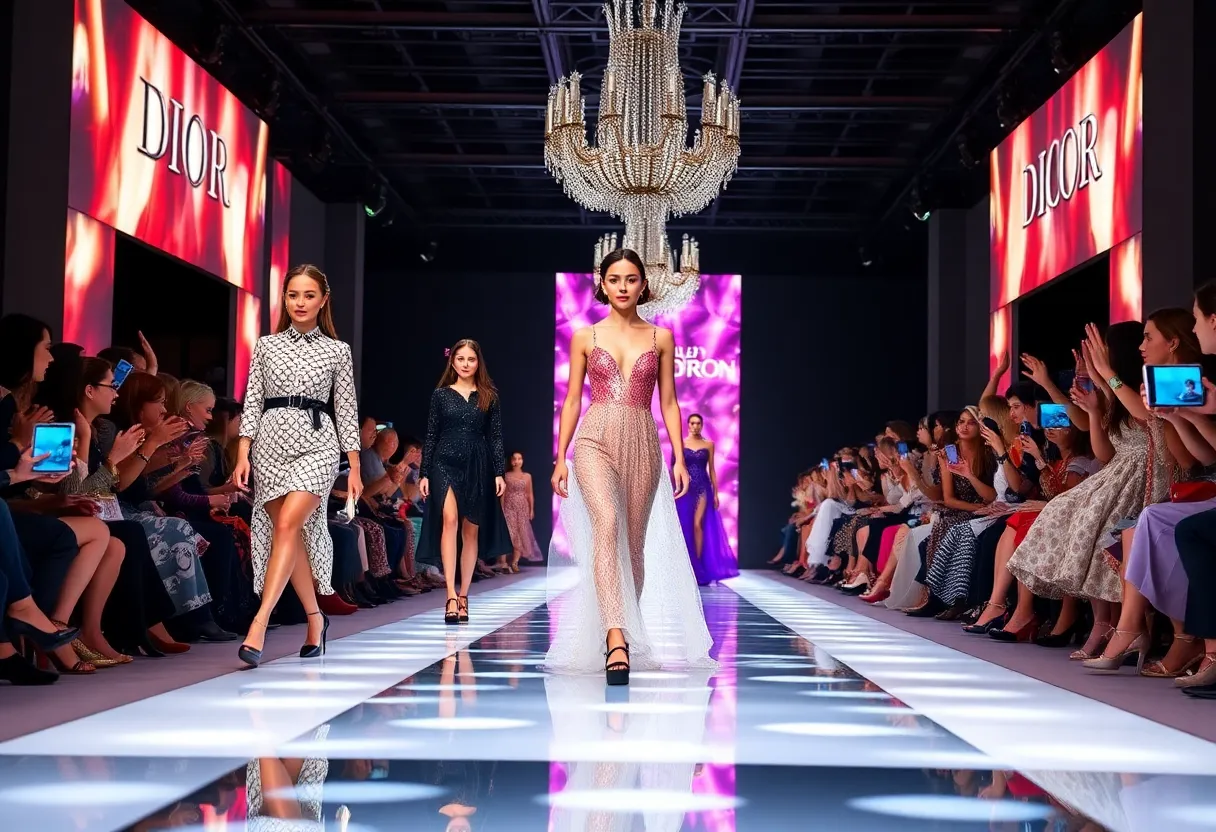

Fashion runway showcasing the latest collections from Dior and Ralph Lauren, illustrating the shifting dynamics in luxury fashion.
In April 2025, the Vogue Business Index reveals surprising trends in luxury fashion. Dior regains its digital leadership, surpassing Louis Vuitton, while Ralph Lauren enters the top five, reflecting changing consumer preferences. With a decline in social media engagement for many brands, opportunities remain for those that innovate and adapt, particularly through celebrity influence and digital product passports.
It’s April 2025, and the fashion world is buzzing with the latest findings from the Vogue Business Index for the first half of the year. This semi-annual scorecard, which checks in on 60 major luxury fashion brands, is revealing some surprising trends in the booming yet volatile world of high fashion.
Once again, Dior has risen to reclaim its position at the pinnacle of digital performance, outpacing Louis Vuitton, which briefly held the crown in late 2024. Dior’s exceptional performance can be attributed to its savvy engagement strategies across both Western and Chinese social media platforms. Shifting gears from brand to brand, it’s remarkable to see how Dior found favor with the digital audience, earning outstanding interaction rates and high search volumes on Google.
Adding more excitement to this year’s index, Ralph Lauren has entered the top five for the first time, bumping the iconic Chanel out of the spotlight. This leap is particularly noteworthy, given that nearly 24% of consumers expressed a desire to move towards more affordable brands due to increasing prices within the luxury market. Ralph Lauren’s uplift showcases the shifting landscape of consumer preferences—from traditional luxury toward premium brands that still offer a sense of elegance.
The digital space has been facing a steep climb post-pandemic. Brands overall are experiencing a ‘digital recession’, with a stark decline in social media engagement noted. Engagement on platforms like Instagram and Weibo has plummeted by 19% and 4%, respectively, and YouTube views have dropped significantly by 93%. While many brands are struggling to keep audiences engaged, a few, including Dior, Tommy Hilfiger, and Ferragamo, are managing to find their footing.
Interestingly, social media remains a vital avenue for discovery among luxury consumers. A vast 40% of them discover brands through these platforms, and another 40% rely on social channels for research before making purchasing decisions. With numbers like these, it’s clear that luxury brands have a golden opportunity to engage customers through entertaining content while emphasizing core values like quality and innovation—especially crucial during economic downturns.
The index also welcomed some fresh names this year: Ami Paris, Jacquemus, and Maje, with rankings at 38, 39, and 60. These brands are employing varied strategies to gain traction. Ami Paris, for instance, leverages traditional digital tactics, using celebrity endorsements to embody its storied heritage. On the flip side, Jacquemus is fostering a playful brand presence designed to capture attention online. While Maje boasts a solid follower count, it seems to struggle with active engagement, indicating a need for more culturally relevant content.
It’s worth noting how critical celebrity influence remains in the luxury sector. Many of the top brands are smartly leveraging star power to enhance visibility, thus driving engagement in an ever-evolving digital marketplace. Brands like Prada shine due to their connections with the arts and culture, leading to engaging events that further boost their standing on social platforms.
The conversation doesn’t stop with social media. As brands adapt to EU regulations, Digital Product Passports (DPPs) are quickly becoming the norm. These passports add a digital identity to luxury items aimed at enhancing customer interactions. However, challenges persist in ensuring consumers understand and appreciate these digital identities, with technology awareness and utility at the forefront. Despite the obstacles, the potential for deeper consumer engagement is enormous with these innovations.
As we delve deeper into 2025, it’s invigorating to witness the shifting dynamics of the luxury fashion space. Dior is leading the way once again, while Ralph Lauren is making headlines with its remarkable ascent. The need for brands to adapt and innovate has never been clearer, showcasing that in this industry, agility and creativity are the keys to success.
Luxury Shopping Experience Coming to Mount Pleasant
Society Apartments Opens in Downtown Charleston
M. Dumas and Sons: Celebrating Tradition and Growth in Charleston
Charleston Marks 80 Years of The Beach Co. with New Leadership
Fashion Trends Taking Center Stage: Insights from the Industry
News Summary Myrtle Beach is currently grappling with severe wildfires that have led to a…
News Summary A heartbreaking murder-suicide in North Charleston has left the community in shock. Darius…
News Summary Over 170 wildfires are spreading across North and South Carolina, particularly affecting Myrtle…
News Summary A devastating two-vehicle collision in Darlington County on Friday evening claimed the lives…
News Summary In a thrilling Sweet 16 clash, the South Carolina Gamecocks narrowly defeated the…
News Summary On an enjoyable day in Baltimore, Paul M. D'Amore, founder of D'Amore Personal…